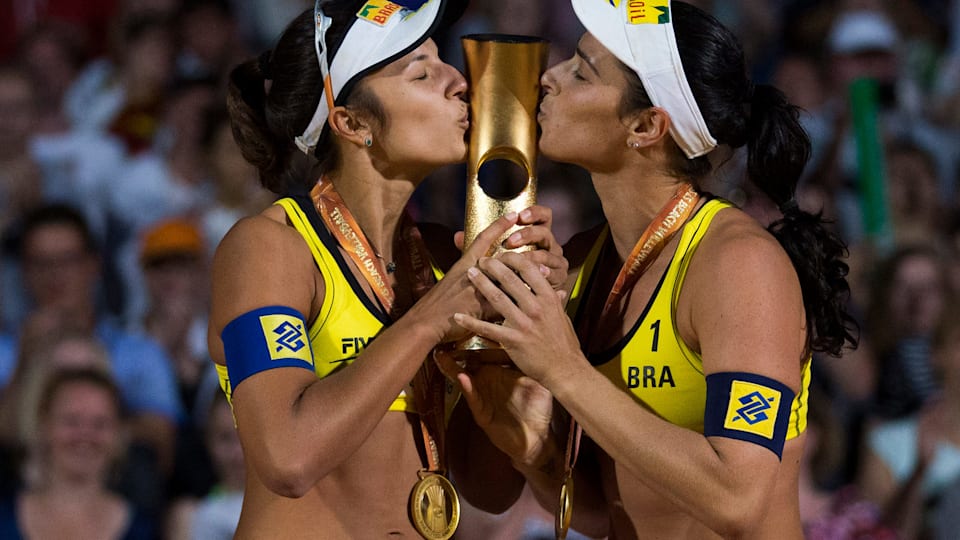
Hosts Brazil dominate the women’s FIVB Olympic Ranking, with Larissa Franca and Talita Antunes leading the way from Barbara Seixas de Freitas and Agatha Bednarczuk. Both pairs will be representing the home nation at the Rio 2016 competition, which runs from 6 to 18 August.
Seixas de Freitas and Bednarczuk owe their second place in the ranking to their stunning performance at last year’s world championships in The Hague (NED). After topping their section without losing a match, the Brazilians went on to beat Canadian pairs Broder/Valjas 2-1 in the last 32 and Humana-Paredes/Pischke 2-0 in the round of 16.
China’s Wang/Yue were their next victims in the quarters, going down 2-0, a scoreline Seixas de Freitas and Bednarczuk repeated in beating fellow Brazilians Maria Antonelli/Juliana in the semis and Lima/Fernanda in the final, with the South American nation sweeping the podium. In taking the world title, the Brazilian pair will have the honour of playing the opening match of Rio 2016.
Born in Rio on 8 March 1987, Seixas de Freitas won the world U-19 title in 2005 alongside Carolina Aragão, with the pair then going on to take the world U-21 crown the following year, which Seixas de Freitas won again in 2007, this time in partnership with Liliane Maestrini.
After turning professional, she has enjoyed success on the FIVB Beach Volleyball World Tour and won bronze with Maestrini at the 2013 World Championships in Stare Jablonski (POL).
Nearly four years her senior, the Curitiba-born Bednarczuk has been on the circuit for over a decade and teamed up with Seixas de Freitas in 2014, a year before their world title win.
Dedicated to the game
Explaining the secret to their success, Seixas de Freitas said: “I think there’s no other answer than work. You have to work and work and work, and train and train and train. Everything in your life that you do, you have to do it with a lot of dedication. I think there’s no short way to it. If you want to be a professional, you really have to take what you do seriously and really train hard.
“What I love about beach volleyball is that you have to be an all-round athlete,” she continued. “There are only two players on the court and you have to push yourself to the limit and be able to manage your weak points, because there are no substitutes. You always have to do your best and be as good as you can be. That’s what I love about this sport.”
With the Olympics a matter of days away, she added: “We’re thinking about it a lot, but we’re not getting wound up about it. It’s good, though, to be thinking about it and to create some positive energy around the Olympic tournament by picturing what the venue’s going to be like with the fans and the atmosphere.”
“I think it would be great for the Brazilians if everybody could come and watch us there. It will mean the world to us,” added Seixas de Freitas. “The more people the better to cheer for everybody. So come and check it out.” Setting the scene for his sport at Rio 2016, FIVB beach volleyball events director Angelo Squeo said: “Beach volleyball is returning to the magical Copacabana beach, where our sport gained recognition in 1993. We organised a fantastic competition that February, and in September the IOC decided to add beach volleyball to the Olympic programme. It’s especially exciting to be coming back to this beach.”
Beach volleyball first appeared on the Olympic programme at Atlanta 1996, with the 24-team men’s and women’s competitions both involving a group phase followed by knockout rounds.
Brazil women have figured large since the sport made its Games debut. Jackie Silva and Sandra Pires won gold in 1996, while compatriots Adriana Behar and Shelda Bede landed silver at Sydney 2000 and Athens 2004, and Larissa França and Juliana Silva took bronze at London 2012, where the USA’s Kerri Walsh-Jennings and Misty May-Treanor claimed their third gold in a row.
One of Rio’s most famous attractions, the world-famous Copacabana will take over from London’s Horse Guards Parade and provide the setting for the men’s and women’s events at the 2016 Games. With vociferous crowds cheering them on at the temporary stadium erected on the beach, the 48 teams going for the two gold medals are sure to receive all the support they need as they bid for places on the podium.
